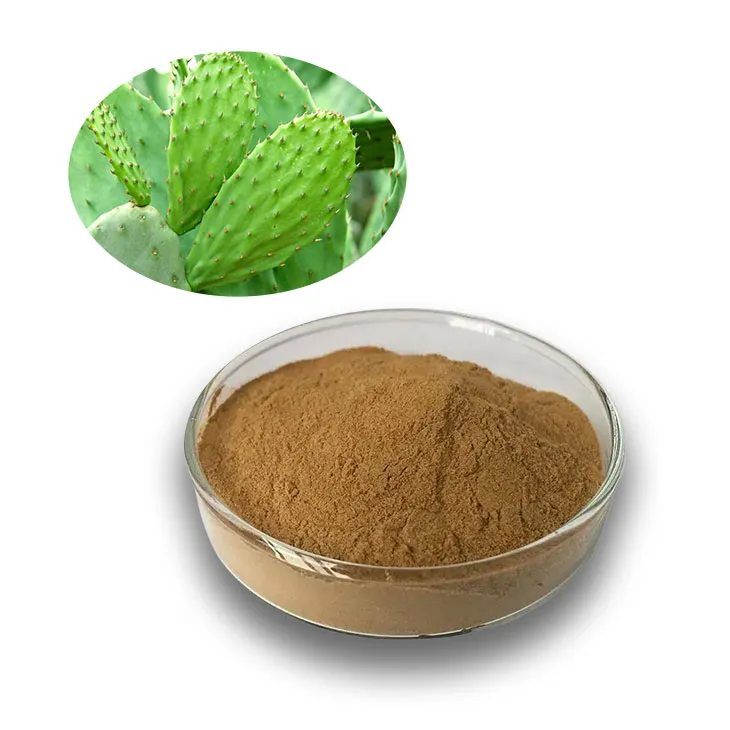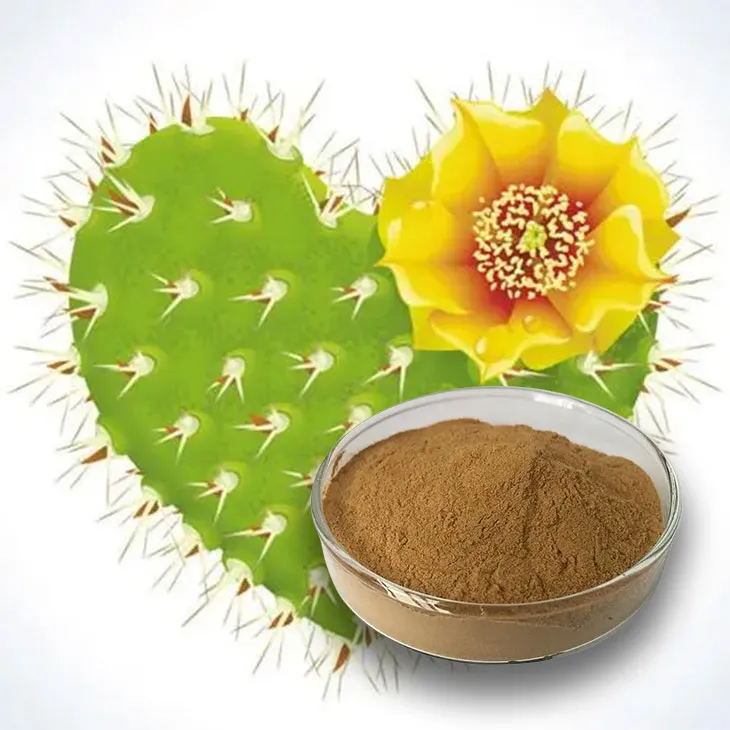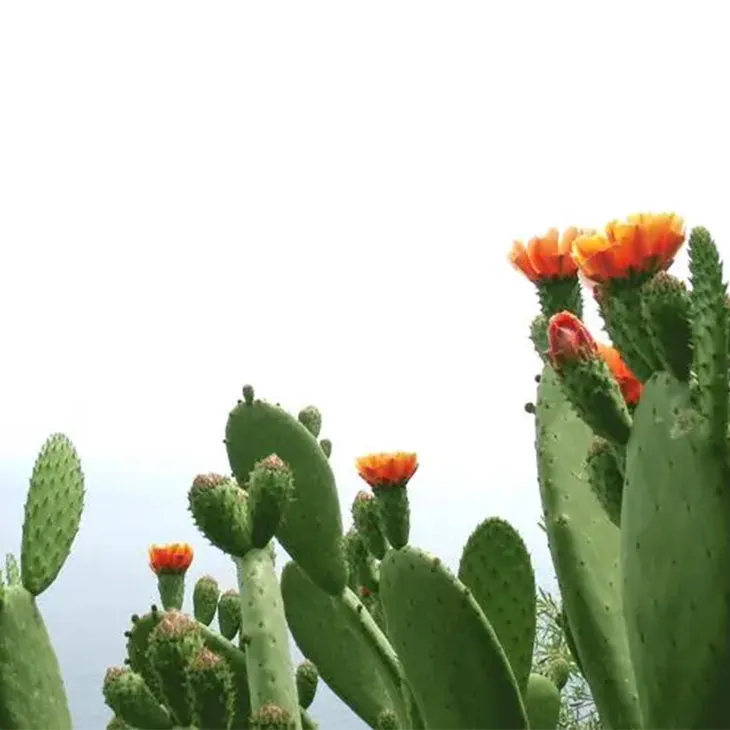- 0086-571-85302990
- sales@greenskybio.com
Best Answers to 7 Key Questions about Cactus Extracts
2024-12-22

1. What is the Origin of Cactus Extracts?
Cactus Extracts are derived from various species of cacti, which are native to the Americas. These plants have evolved to survive in arid and semi - arid regions, developing unique characteristics. Opuntia, also known as prickly pear cactus, is one of the most commonly used cacti for extraction. It can be found in regions from the southwestern United States to Central and South America. Another notable cactus is the Cereus species, which is also a source of valuable extracts. Cacti have been part of the local ecosystems and cultures in these regions for centuries. Indigenous peoples have long used different parts of the cactus for various purposes, including food, medicine, and even in religious ceremonies. This traditional knowledge has paved the way for modern research and the extraction of beneficial compounds from cacti.

2. What are the Potential Health Benefits of Cactus Extracts?
Cactus extracts offer a range of potential health benefits:
- Antioxidant Properties: Cactus extracts are rich in antioxidants such as flavonoids, phenolic acids, and betalains. These antioxidants help to combat oxidative stress in the body. Oxidative stress is associated with various chronic diseases, including heart disease, cancer, and neurodegenerative disorders. By neutralizing free radicals, cactus extracts may contribute to overall health and well - being.
- Blood Sugar Regulation: Some studies suggest that cactus extracts may have a positive impact on blood sugar levels. They may help to improve insulin sensitivity and regulate glucose metabolism. This makes them potentially beneficial for individuals with diabetes or those at risk of developing diabetes.
- Digestive Health: Cactus extracts can also support digestive health. They may have a mild laxative effect, helping to promote regular bowel movements. Additionally, they may soothe the digestive tract and reduce inflammation, which is beneficial for those with digestive disorders such as irritable bowel syndrome (IBS).
- Immune System Boost: The nutrients and bioactive compounds in cactus extracts can strengthen the immune system. They may enhance the body's ability to fight off infections and diseases by stimulating the production of immune cells and antibodies.

3. How are Cactus Extracts Used in the Beauty Industry?
In the beauty industry, cactus extracts have found numerous applications:
- Moisturizing: Cactus extracts are excellent natural moisturizers. They have the ability to retain water, which helps to keep the skin hydrated. This makes them a popular ingredient in moisturizing creams, lotions, and serums. For example, prickly pear cactus extract can penetrate deep into the skin layers, providing long - lasting hydration.
- Anti - Aging: The antioxidants in cactus extracts play a crucial role in anti - aging. They can protect the skin from damage caused by free radicals, such as wrinkles, fine lines, and age spots. By reducing oxidative stress, cactus extracts can help to maintain the skin's elasticity and firmness.
- Soothing and Healing: Cactus extracts have anti - inflammatory properties, which make them effective in soothing irritated skin. They can be used to treat sunburns, minor cuts, and skin rashes. They also promote the healing process of the skin by accelerating cell regeneration.
- Hair Care: Cactus extracts are also used in hair care products. They can nourish the hair follicles, strengthen the hair shafts, and improve hair texture. For instance, some hair masks and shampoos contain cactus extract to add shine and volume to the hair.

4. What are the Applications of Cactus Extracts in the Food Industry?
The food industry has also incorporated cactus extracts in different ways:
- Natural Coloring Agent: Some cactus extracts, especially those rich in betalains, are used as natural coloring agents. They can provide vibrant colors such as red, purple, and yellow to food products, replacing synthetic food colorings. This is especially appealing to consumers who prefer natural and clean - label products.
- Functional Ingredient: Cactus extracts can be added to food as a functional ingredient. For example, they can be used in beverages to provide additional health benefits, such as antioxidant and blood - sugar - regulating properties. They can also be added to yogurts, smoothies, and other dairy products.
- Flavor Enhancer: Certain cactus extracts can enhance the flavor of food. They add a unique, slightly sweet and earthy flavor to dishes. In some traditional cuisines, cactus extracts have been used for centuries to enhance the taste of soups, stews, and salads.
5. What are the Different Extraction Methods for Cactus Extracts?
There are several methods for extracting cactus extracts:
- Solvent Extraction: This is one of the most common methods. Organic solvents such as ethanol or methanol are used to dissolve the bioactive compounds from the cactus material. The cactus is usually dried and ground into a powder before the extraction process. After the extraction, the solvent is removed through evaporation, leaving behind the concentrated cactus extract. However, this method requires careful handling of the solvents to ensure safety and avoid contamination.
- Pressurized Liquid Extraction: Also known as accelerated solvent extraction, this method uses high pressure and temperature to extract the compounds from the cactus. It is a relatively fast and efficient method, and it can often extract a higher yield of bioactive compounds compared to solvent extraction. However, it requires specialized equipment.
- Supercritical Fluid Extraction: In this method, supercritical fluids, usually carbon dioxide, are used as the extraction medium. Supercritical carbon dioxide has properties between a gas and a liquid, which allows it to effectively extract the desired compounds from the cactus. This method is considered more "green" as carbon dioxide is non - toxic and can be easily removed from the final extract. It is also suitable for extracting heat - sensitive compounds.
6. Are There Any Side Effects or Precautions Associated with Cactus Extracts?
While cactus extracts are generally considered safe, there are some precautions to keep in mind:
- Allergic Reactions: Some individuals may be allergic to cactus extracts. Allergic symptoms can include skin rashes, itching, and swelling. People with known allergies to plants, especially cacti, should avoid using products containing cactus extracts.
- Interaction with Medications: If you are taking medications, especially those for diabetes or blood - thinning, it is important to consult your doctor before using cactus extracts. There may be potential interactions that could affect the effectiveness of your medications or cause adverse effects.
- Pregnancy and Breastfeeding: There is limited research on the safety of cactus extracts during pregnancy and breastfeeding. As a precaution, it is advisable for pregnant and breastfeeding women to avoid using cactus extracts unless recommended by a healthcare provider.
7. What is the Future of Cactus Extracts?
The future of cactus extracts looks promising:
- Expanding Research: As more research is conducted on cactus extracts, we are likely to discover new health benefits and applications. This will further drive the demand for cactus extracts in various industries.
- Innovation in Extraction Technology: Advances in extraction technology will likely lead to more efficient and sustainable methods of extracting cactus extracts. This will not only improve the quality of the extracts but also reduce the cost of production.
- Market Growth: The increasing consumer demand for natural and sustainable products will fuel the growth of the cactus extract market. We can expect to see more cactus - extract - based products in the beauty, health, and food industries in the coming years.
FAQ:
Question 1: What is the origin of cactus extract?
Cactus extract comes from various species of cacti. Cacti are native to the Americas, mainly found in arid and semi - arid regions. Different types of cacti grow in different habitats, such as deserts, grasslands, and scrublands. The extract is obtained from different parts of the cactus, including the stems, fruits, and sometimes the roots, depending on the intended use.
Question 2: What are the potential health benefits of cactus extract?
Cactus extract may have several potential health benefits. It is often rich in antioxidants, which can help protect cells from damage caused by free radicals. Some cactus extracts may also have anti - inflammatory properties, potentially helping with conditions like arthritis. Additionally, it might aid in digestion as it could contain certain fibers or enzymes that support the digestive process. There are also claims that it can help regulate blood sugar levels, although more research is needed to confirm this.
Question 3: How is cactus extract used in the beauty industry?
In the beauty industry, cactus extract is used in various ways. It can be found in skincare products like moisturizers, serums, and face masks. The extract's moisturizing properties are beneficial for hydrating the skin, especially for dry or dehydrated skin types. It may also have anti - aging effects due to its antioxidant content, which can help reduce the appearance of wrinkles and fine lines. Some cactus extracts are used for their soothing properties, helping to calm irritated skin.
Question 4: What are the common extraction methods for cactus extract?
Common extraction methods for cactus extract include solvent extraction and cold - pressing. Solvent extraction involves using solvents like ethanol or water to dissolve the active compounds from the cactus material. Cold - pressing is another method, especially suitable for extracting oils from cactus fruits. This method helps to preserve the integrity of the active ingredients as it does not involve high temperatures that could potentially degrade them.
Question 5: Are there any side effects of cactus extract?
While cactus extract is generally considered safe for most people, there can be some side effects. In some cases, it may cause allergic reactions, especially in individuals who are allergic to plants in the cactus family. Also, if consumed in large amounts, it could potentially cause digestive issues such as diarrhea or stomach cramps. However, these side effects are relatively rare and usually occur only in extreme cases.
Question 6: How is cactus extract used in the food industry?
In the food industry, cactus extract can be used as a natural flavoring agent or a food additive. It can add a unique flavor to certain products. Some cactus extracts are also used in functional foods due to their potential health - promoting properties. For example, cactus - based drinks are becoming more popular as they are seen as a healthy alternative to sugary beverages.
Related literature
- The Health Benefits of Cactus Extracts: A Comprehensive Review"
- "Cactus Extract in the Beauty Industry: Current Trends and Future Prospects"
- "Extraction Methods of Cactus - Derived Compounds: A Comparative Study"
- ▶ Hesperidin
- ▶ citrus bioflavonoids
- ▶ plant extract
- ▶ lycopene
- ▶ Diosmin
- ▶ Grape seed extract
- ▶ Sea buckthorn Juice Powder
- ▶ Beetroot powder
- ▶ Hops Extract
- ▶ Artichoke Extract
- ▶ Reishi mushroom extract
- ▶ Astaxanthin
- ▶ Green Tea Extract
- ▶ Curcumin Extract
- ▶ Horse Chestnut Extract
- ▶ Other Problems
- ▶ Boswellia Serrata Extract
- ▶ Resveratrol Extract
- ▶ Marigold Extract
- ▶ Grape Leaf Extract
- ▶ blog3
- ▶ blog4
- ▶ blog5
-
Pure 85% Tomentil Extract.
2024-12-22
-
Wheat Germ Extract
2024-12-22
-
Licorice Root Extract Powder
2024-12-22
-
Lavender Extract
2024-12-22
-
Sugarcane Extract
2024-12-22
-
Lemon Juice Powder
2024-12-22
-
Soy Extract
2024-12-22
-
Phellodendron Extract
2024-12-22
-
Sea buckthorn oil
2024-12-22
-
Citrus Aurantii Extract
2024-12-22
-
Kelp Extract Powder
2024-12-22





















